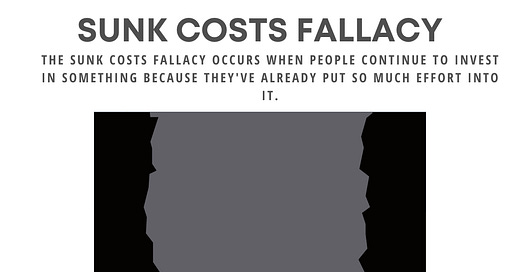Hey friend 👋
Today we will discuss a mental model called The Sunk Costs Fallacy.
This is where we let our past mistakes weigh down on our future decisions.
The “costs” of the pasts, impact the “investments” for the future.
Today is going to be fun!
But first, let’s look at the find of the week -
🤩 Find of the week
Recently, we found a really fun daily newsletter that helps you become the smartest person in the room - Wise Daily.
They share weird facts and ideas with business skills that you can apply instantly. Found it quite fun. Do check it out.
Now, onto today’s topic -
The Sunk Costs Fallacy
🤔 What is it?
The Sunk Costs Fallacy is our tendency to stick with poor past decisions because we are too deeply invested in them.
We think of those past costs as investments.
And we don’t want to back away from those investments right before they start paying dividends.
Without realizing that those supposed “investments” are actually “costs” that are dragging back our ability to make sound future investments.
💡Where does this model come from?
This model comes from accountancy, where the costs already borne for a business and cannot be recovered anymore are called sunk costs.
You know stuff like buying heavy machinery and equipment. Stuff like that.
But this concept applies to a wide array of fields— like business, finance and even personal relationships.
🎯How Should We Tackle The Sunk Costs Fallacy?
There are 3 important steps to tackle Sunk Costs Fallacy:
Know It’s A Cost. Don’t live under the illusion that your past decisions were investments. Think of them as costs, and objectively evaluate if those costs add any value to you now or not.
Re-evaluate your Decision. Rethink about your decisions with an open mind. Nothing in life is set in stone. Be nimble, assess your decisions and change them if needed.
Know Your Stop Loss. Have some humility and accept some losses. Be ready to walk away from past mistakes. Be ready to change your own mind.
The ability to comfortably change your mind is at the heart of prudent decision-making.
Successful decision-makers don’t make one off great decisions, instead they follow a rational process and are always open to re-evaluate their decisions.
They iterate and evolve their process and over time become masters at the craft.
Continue Reading…
For a deeper discussion on Sunk Costs Fallacy and detailed examples read an older issue of The Wisdom Project -
In that post we share 2 practical examples of how this fallacy plays into our life in areas like Money and Relationships.
And we also share 1 example of how we’ve tackled sunk costs fallacy and improved this very project at different situations over the years. Do read it.
Already a subscriber? share it with a cool friend 🙏
Quote to think about -
“The Sunk-costs fallacy keeps people for too long in poor jobs, unhappy marriages and unpromising research projects”
- Danile Kahneman
Question to ask yourself -
Which one of your past decisions is holding you back right now? What can you do to shed the weight and move on from it? How can you fight past the sunk cost?
Think about it!
More from us
How can we help you?
Whenever you’re ready, there are 3 ways we can help you -
📈 Make better decisions across health, wealth and relationships. Learn the mental models for busy professionals here.
💪 Build new habits, shed bad habits, become the best version of yourself here.
🧠 Find your Mastermind here.
Help us Improve
Help us improve this newsletter. Just hit reply and share what you thought of this issue, or click on an emoji below 👇
Thank you for reading 🙏
That's our time this week. See you next week 👋
Important update:
If you’ve not been having fun here, please consider unsubscribing.
We don’t mind.
No hard feelings.
We would prefer it if you unsubscribe than not open the newsletter.
But if you do enjoy it.
Please do us a favor, please ask one of your friends to subscribe.
We rely on word of mouth to grow this newsletter.
It would mean a lot to us🙏
Cheers,
Ayush & Aditi
PS: If someone cool shared this with you, then make sure you sign up to stay in the loop :)





Over a long enough period of time, everything is a sunk cost, no ?